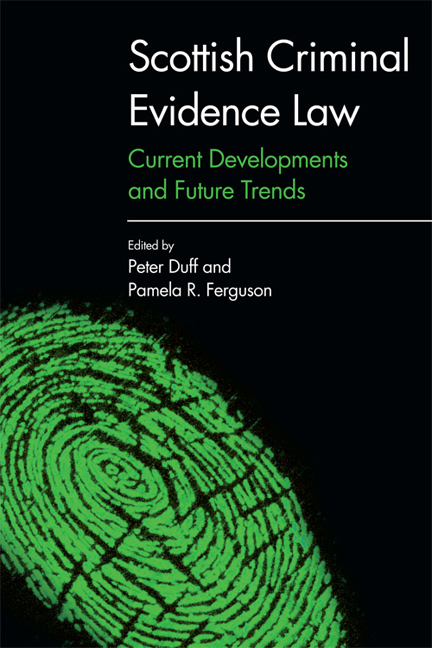Book contents
- Frontmatter
- Contents
- The Contributors
- Acknowledgements
- Table of Cases
- Table of Legislation
- Introduction
- 1 Cadder and Beyond: Suspects’ Rights and the Public Interest
- 2 ‘Access to Justice’ for Complainers? The Pitfalls of the Scottish Government’s Case to Abolish Corroboration
- 3 The Relevance of Sexual History and Vulnerability in the Prosecution of Sexual Offences
- 4 ‘Similar Fact’ Evidence and Moorov: Time For Rationalisation?
- 5 Hearsay in Scots law: Rethinking and Reforming
- 6 Eyewitness Identification Evidence and its Problems: Recommendations for Change
- 7 Assessing Witness Credibility and reliability: Engaging Experts and Disengaging Gage?
- 8 The process of Criminal Evidence Law Reform in Scotland: what Can We Learn?
- 9 Scottish Criminal Evidence Law Adrift?
- Bibliography
- Index
2 - ‘Access to Justice’ for Complainers? The Pitfalls of the Scottish Government’s Case to Abolish Corroboration
Published online by Cambridge University Press: 24 April 2021
- Frontmatter
- Contents
- The Contributors
- Acknowledgements
- Table of Cases
- Table of Legislation
- Introduction
- 1 Cadder and Beyond: Suspects’ Rights and the Public Interest
- 2 ‘Access to Justice’ for Complainers? The Pitfalls of the Scottish Government’s Case to Abolish Corroboration
- 3 The Relevance of Sexual History and Vulnerability in the Prosecution of Sexual Offences
- 4 ‘Similar Fact’ Evidence and Moorov: Time For Rationalisation?
- 5 Hearsay in Scots law: Rethinking and Reforming
- 6 Eyewitness Identification Evidence and its Problems: Recommendations for Change
- 7 Assessing Witness Credibility and reliability: Engaging Experts and Disengaging Gage?
- 8 The process of Criminal Evidence Law Reform in Scotland: what Can We Learn?
- 9 Scottish Criminal Evidence Law Adrift?
- Bibliography
- Index
Summary
INTRODUCTION
As this collection as a whole aims to demonstrate, recent years have been marked by a Scottish Government drive to reform and ‘modernise’ various features of the Scottish criminal justice system and Scots criminal evidence law. In order to justify this reform and modernisation agenda, the Scottish Government has increasingly relied upon ‘access to justice’ rhetoric. The debate over whether to abolish the corroboration rule is a particularly striking example of this and one that clearly illustrates that ‘access to justice’ is increasingly presented by the Scottish Government as something beneficial to, and necessary for, complainers in sexual offence and domestic abuse cases. Using the corroboration debate as a case study, this essay explores the motivations behind, and consequences of, the Scottish Government's reliance on this principle in this particular way. It argues that ‘access to justice’ language has been, and continues to be, relied upon without full explanation, but that a very particular understanding of what justice entails for complainers, namely direct engagement with the criminal justice system and an increase in prosecution rates, appears to inform its use. This latter observation fits with the claim that penal populism is one of the factors driving reform of Scots criminal evidence law and, as this chapter will demonstrate, is problematic on a number of different levels.
Although the ‘access to justice’ claim was pursued relentlessly by the Scottish Government in the corroboration debate (particularly in its latter stages) the argument was, ultimately, unsuccessful. For the time being at least, it appears that the corroboration rule is here to stay. As explained in more detail later in this chapter, the debate ground to a halt following the publication of the report of the Post-Corroboration Safeguards Review (the ‘Bonomy Review’) in April 2015 and the subsequent announcement by the Justice Secretary that the Government was no longer pushing forward with abolition via s 57 of the Criminal Justice (Scotland) Bill 2013. This ‘U-turn’ was broadly welcomed by many MSPs, members of the legal profession and legal commentators who, to varying degrees and for a host of reasons, were critical of the Government's original plans.
- Type
- Chapter
- Information
- Scottish Criminal Evidence LawCurrent Developments and Future Trends, pp. 41 - 66Publisher: Edinburgh University PressPrint publication year: 2017

